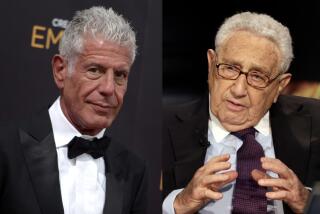Failing a History Test
- Share via
George P. Shultz, secretary of state and sometime professor, flunked a history test last week. In a brooding speech to department employees comparing Vietnam with Nicaragua, Shultz’sbelligerence trailed off into murmurs of political self-pity that left most of his audience in silent bewilderment.
Shultz laid much of the blame for America’s failure in Vietnam on “apologists for communism” in this country and said, speaking shortly after Congress refused to endorse more aid for Nicaraguan guerrillas, that “the litany of apology for communists . . . is beginning again.”
“Broken promises,” he said. “Communist dictatorship. Refugees. Widened Soviet influence, this time near our borders. Here is your parallel between Vietnam and Central America.”
If there is a lesson to be learned from Vietnam--a dubious proposition, because the dozens of so-called lessons simply cancel one another out--it is that no piece of history can be transplanted to the present simply by hurling emotional slogans at a problem.
Nicaragua is not Vietnam, and America has not failed there. What has failed is a devious policy of brute strength, financed by the Central Intelligence Agency, a policy of tepid support for the Contadora negotiating process that most Central American countries prefer, and a policy that changed in midstream from one of preventing Nicaragua from exporting its revolution to one of forcing Nicaragua’s Sandinistas, as President Reagan put it, to “say uncle.”
Elsewhere on these pages today, Henry A. Kissinger, former secretary of state, says that Vietnam came at the worst possible time, at a time when the United States should have been trying to shape a coherent new foreign policy to reflect the fact that it no longer dominates the world’s economy or has “an atomic monopoly.” Vietnam, he says, interrupted that process.
Should Washington get around to a coherent foreign policy, the first principle should be that it is based not on obsession but on careful evaluation of the facts and of national interest in the broadest sense. No such rethinking is evident in the Shultz speech. The interests of the United States will not be served by drubbing the Sandinista government into submission, with all of the memories of Yanqui domination that such a course would revive south of the border. It lies in a patient partnership with other Central American countries in negotiating a settlement with which all parties can live in peace.
More to Read
Sign up for Essential California
The most important California stories and recommendations in your inbox every morning.
You may occasionally receive promotional content from the Los Angeles Times.













